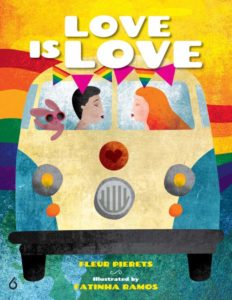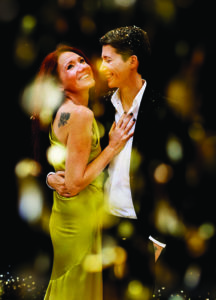A Global Celebration of Love

#LoveIsLove began trending on Twitter in June 2015 after Obergefell v. Hodges established same-sex marriage throughout the United States. To celebrate the motto and their love for each other, artists Fleur Pierets and Julian P. Boom decided to get married in each country that legalized same-sex marriages. They had weddings in New York (US), Amsterdam (The Netherlands), Antwerp (Belgium), and Paris (France), but unfortunately weren’t able to visit the other countries—now up to 29 total (28 countries at the time of publishing)—because Julian passed away from brain cancer soon after their fourth ceremony. Fleur has kept their story alive by publishing two children’s books, Love Around the World and Love is Love: The Journey Continues. Here is my discussion with author Fleur Pierets on the latter book, which was just released November 17, 2020.
Emily Newman: In which country was your favorite wedding or where did you wish you could have gotten married?
Fleur Pierets: We were equally excited to visit every country really. Each one counts and each one has its own LGBTQ heritage and, of course, stories about how marriage equality came about. And we were looking forward to knowing all of them first hand at the end of this project and hopefully meeting a lot of interesting people along the way. We had a huge amount of friends and family in Antwerp (where I’m from) and in Amsterdam (where Julian lived). In New York and Paris we had a few friends but a lot of press.
However, I have to say that the US was very special. It was the very first one and the New York City Clerk was so excited about our project that he married us himself. That was magical and we couldn’t have wished for a better start.
Newman: What traditions did you and Julian repeat at each of your wedding celebrations? Did you share the same vows each time and sign a license during the ceremony? Or was each wedding its own unique creation?
Pierets: All performances were filmed and photographed and shared on our website and through social media, right after every wedding. The moment we completed the whole performance [originally titled “22—The Project” because there were 22 countries at the time of inception] we wanted to assemble an exhibition that traveled to all the countries we visited, showing the wedding photos and videos of all the ceremonies.
Up ‘til the fourth wedding, the uniqueness was the way people got married in those different cities, the things the official said and the protocol. However we were very much looking forward to seeing how this project evolved. For us it was by far the longest performance we had ever done, so we were not yet familiar with our own long-term process. There was a lot of room for new ideas and collaborations along the way. It was something exciting to look forward to and see where it took us. The only thing that was 100 percent sure was that we were going to do this, no matter what. Life decided differently.
Newman: Have you continued to visit each country that allows same-sex weddings yourself?

Pierets: These books gave me the opportunity to finish our wedding project, even if it was only on paper. So there’s no need for me to visit each country. However, I’m playing with the idea of a documentary on same-sex marriage, so who knows. But before thinking about travel we have to see how this pandemic is going to evolve. Currently, I’m writing a new novel. My first one, Julian, about my wife and the work we did as a female artist couple, will be turned into a feature film. The book [Love is Love: The Journey Continues] is currently translated from Dutch to English.
Newman: As marriage equality becomes more widespread, will you develop more volumes to keep the wedding journey going?
Pierets: I hope so, because change starts with knowledge. People need to know that things are not the same for all people, that there are differences that exist, but really shouldn’t. This goes for racial equality, gender equality, and just any kind of inequality really. Amongst many other things, people need to know that in most countries around the world you can’t get married as a gay person. Most countries are even hostile towards us and you have to think twice before even traveling there. These are very normal things to think about in the life of an average gay person, but do other people know that? Turns out most people don’t, not because they don’t want to but just because they don’t know about it. So our wedding project was about sharing with people what you feel and experience out in the world, but it always has to be in a positive way. That’s the first step towards lasting change, in my opinion.
I hope these books will help kids develop critical thinking, and to have an open mind and see that difference isn’t bad. That inclusion represents strength and that love comes in many forms.
Newman: Lastly, I’m curious, what’s the story with the rabbit in sunglasses that’s featured in the book?
Pierets: We thought it was very funny to add an extra character to the story. The bunny is our stuffed animal that comes to life for the children reading the book. It’s our good luck charm.
Although our current Supreme Court has threatened the safety of marriage equality in the US, the American Humanist Association will continue to support LGBTQ rights and The Humanist Society celebrants will provide weddings and elopements for couples looking for meaningful ceremonies that celebrate their love.
